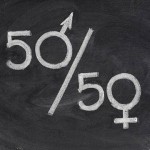 The public was informed about the latest session of the inter-department work group for changes of the election legislation in BiH
The public was informed about the latest session of the inter-department work group for changes of the election legislation in BiH
Unfortunately, a significant change was hidden from the public – one that affects the issue of equal participation of women and men. In its session in
Capljina, the inter-department work group recommended to change the Article 4.19, paragraph 4, to read: “Every list of candidates, submitted for the direct election, includes candidates of male and female sex, which are equally represented. Equal representation of sexes exists when one of the sexes is represented with at least 40% of the total number of candidates on the list, unless the list consists of three candidates, in which case the equal representation of sexes exists when one of the sexes is represented with 1/3 of the total number of candidates.”
This recommendation clearly downgrades the existing regulation (gender quota), which stipulates the representation of both sexes with minimal 40% – not anywhere on the candidate lists, but with mandatory place for female candidates in the first three, five and eight places. The recommended change, proposed by HDZ BiH vice president Borjana Kristo in the session of the inter-department work group and supported unanimously by members Lazar Prodanovic, Halid Genjac, Ognjen Tadic, Vlado Rogic, Branko Peric, Ahmed Santic and Josip Grubesa, significantly downgrades the existing rule. For example, according to the recommendation, it will be possible to make a list of candidates with 20 persons, of which top twelve are men and the remaining eight are women, which would be a significant setback. Why that change? Will the new regulation improve the election process and prevent election fraud? Will the election process be more democratic?
We, the civil society organizations that work actively on building a better and more democratic Bosnia and Herzegovina, oppose this attempt to put women in an unequal position in political life.
We call on all members of the interdepartment work group for changes of the election legislation in BiH, as well as political parties, members of the BiH Parliamentary Assembly and representatives of the international community, to refrain from watering down the already insufficiently efficient measures for equal participation of women and men, and instead work on changes that will introduce the 50% election quota and mandatory alternate positioning of male and female candidates. Article 4.19, paragraph 4 should be changed to read: “Every list of candidates has equal number of candidates of male and female sex, positioned alternately throughout the list.”
With the introduction of such regulation, Bosnia and Herzegovina would make a significant step towards improvement of gender equality in political life. The current level of representation of women is at some 20% at all government levels. Unless the legal regulations are improved, it will take at least 20 years to increase the number of women and reach the minimum level of 40%. Since women make more than 50% of the population, they should be adequately represented in politics as well. Therefore, equal representation of women on election lists should be legally guaranteed.
Finally, let’s show that Bosnia and Herzegovina can be a model example for other countries of Southeast and East Europe, instead of becoming the subject to criticism and an example of bad practice.
 Do not abolish existing Gender Quota in the Electoral Law, increase it to 50%
Do not abolish existing Gender Quota in the Electoral Law, increase it to 50%